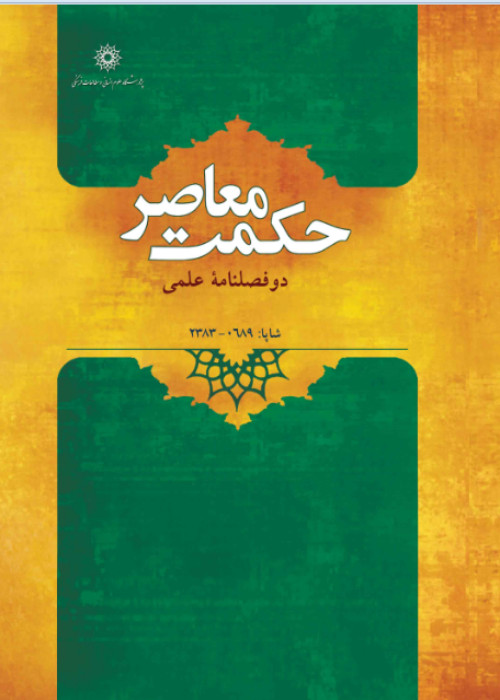A Critical Study of the Role of the Prophet in Religious Epistemology in al-Ghazali’s View
For al-Ghazali, “prophet-hood means preaching God’s words and the prophet is the preacher of God’s words”. The main question of the present study is what part in al-Ghazali’s view the prophet has in knowledge about God and what challenges his views bring. A discussion of “miracle” as the reason for the truthfulness of the prophet is absolutely essential for tackling that question. From al-Ghazali’s point of view, prophets’ knowledge is gained through a light shed onto their hearts, rather than through sensations or education. Some recipients of the prophets’ knowledge only imitate what they hear, while some enjoy insights. In al-Ghazali’s work, imitation is of two kinds: acceptable and unacceptable. He believed that Islamic scholars (ūlamā) can achieve understanding on their own and it is only the masses who imitate. One of al-Ghazali’s stances where one could see the role of the prophet in his religious epistemology is on the necessity of thanking the Giver of blessings (wujūb-i shukr-i mun’im): from his point of view, the necessity is jurisprudential and stated by the prophet rather than rational. According to him, reason cannot achieve knowledge about the affairs because of which the prophet was appointed, and this is why the prophet was appointed. But, if reason cannot achieve knowledge about the affairs, how can it affirm the prophet’s prophet-hood and message? In some of his works al-Ghazali regards miracle as the proof for the truthfulness of the prophet. In some others, in addition to miracle he refers to such evidence as prophet’s words, actions, and states in which the prophet was, reported numerously by different narrators and through different chains of transmission. He maintains that the role of reason and theory is merely that through miracle they make sense of the truthfulness of the prophet. Then they depose themselves, admitting that whatever the prophet says about God and the Day of Judgment is acceptable. And this is among the affairs in understanding which reason enjoys no independence. Nor does it understand its impossibility. But even if we involve reason at the stage of proving truthfulness of the prophet, then it is the reason which should affirm the good of the truthfulness (ḥusn-i sidq), thereby jurisprudential good and evil being questioned. From a point of view outside religion and using a rational and argumentative method this study critiqued and examined al-Ghazali’s teaching on prophet-hood, and reached the conclusion that his view changed in his different works. In his theosophical works he said that reason judges that anyone who claims to be a prophet and produces a miracle is necessarily truthful, and then reason withdraws, assumes an instrumental role, and submits to the prophet’s remark. In some other works, however, he does not consider miracle to be enough, as miracle might be confused with magic, and therefore he thinks that proving the prophet’s truthfulness needs further signs. In general, al-Ghazali’s explanation of the epistemological role of the prophet in people’s acquisition of knowledge has many flaws which have been addressed in this article. On the one hand, he acknowledges reason’s limits and thinks that appointment of the prophet is accounted for by the fact that the prophet understands affairs that go beyond reasoning. On the other hand, he states that reason can discern the existence of the prophet as well as the fact that the prophet can understand affairs beyond reasoning. Yet it cannot understand what the prophet understands. There occurs a paradox, which is how it can be rationally proved that a person can understand affairs beyond reasoning. When reason does not have access to the affairs, it might have no judgment: there could be a mention of faith only. Reason can only consider the possibility of such a thing. But it cannot prove it i.e. cannot demonstrate undoubtedly and rationally that the one who is the prophet can understand affairs beyond reasoning. In fact, on the one hand it seems that reason is the chief determinant, as it understands prophet’s truthfulness. On the other hand, even if we ignore the challenges connected to the issue, it seems that the prophet plays a very determinant part in religious knowledge, and that without revelation given by the prophet reason fails to enter the field of religious knowledge. Furthermore, since in al-Ghazali's view the prophet is connected to the main source of knowledge and is taught by God and Gabriel, his words are preferable over limited human reason’s judgment, and thus although al-Ghazali tries hard to provide an argument for prophet’s truthfulness, in his religious epistemology the prophet has the highest status.
- حق عضویت دریافتی صرف حمایت از نشریات عضو و نگهداری، تکمیل و توسعه مگیران میشود.
- پرداخت حق اشتراک و دانلود مقالات اجازه بازنشر آن در سایر رسانههای چاپی و دیجیتال را به کاربر نمیدهد.


